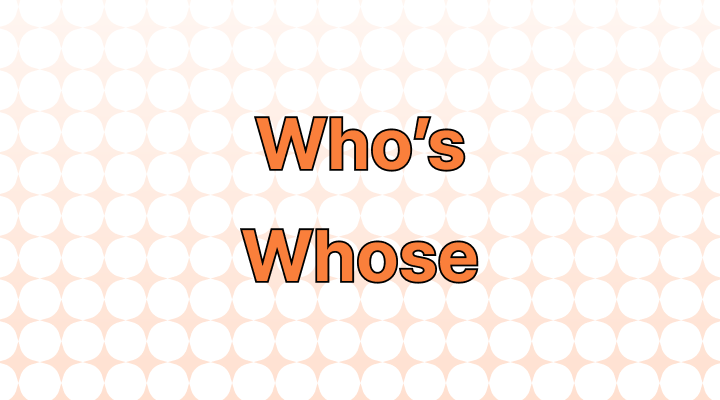Are you puzzled by the difference between "who's" and "whose"? You're not alone! "Who's" is a contraction of "who is" or "who has." "Whose" is a pronoun indicating possession or ownership.
These two words may sound similar, but they serve distinct purposes in English. In this blog post, we'll explore the meaning, differences, and usage of "who's" and "whose." Plus, we'll dive into common idioms and phrases, provide synonyms, and even offer some practice questions to test your knowledge.
Understanding "Who's" and "Whose"
"Who's": This is a contraction of two words—"who" and "is" or "who" and "has." It's used to represent "who is" or "who has."
- Example 1: Who's coming to the party? (Who is coming to the party?)
- Example 2: Who's seen my keys? (Who has seen my keys?)
"Whose": This is a pronoun used to indicate possession. It shows that something belongs to someone.
- Example 1: Whose book is this? (To whom does this book belong?)
- Example 2: Whose idea was it to go camping? (To whom does the idea of going camping belong?)
Common Idioms and Phrases
1. Know whose bread is buttered: This idiom means to know where your interests lie or who provides for you.
- Example: She always makes sure to please her boss; she knows whose bread is buttered.
2. Who's who: This phrase is used to ask about the identity or significance of various people, especially in a particular field or group.
- Example: At the conference, I couldn't tell who's who among the famous scientists.
3. For whose benefit: This phrase is used to inquire about the reason or purpose behind an action.
- Example: The new policy was introduced, but I wonder, for whose benefit?
4. Who's to say: This expression is used to indicate uncertainty or that it's difficult to predict something.
- Example: Who's to say what the future holds for us?
In Conclusion
Understanding the difference between "who's" and "whose" is essential for clear and accurate communication. "Who's" is a contraction that represents "who is" or "who has," while "whose" is used to indicate possession. Now that you've learned the distinctions and explored some idioms, phrases, and synonyms, you're better equipped to use these words correctly in your writing and conversations. Keep practicing, and soon you'll become a master of "who's" and "whose"!
Practice Questions
- Who's/Whose coming to the concert tonight?
- Who's/Whose car is parked in front of the house?
- I wonder who's/whose going to clean up this mess.
- Who's/Whose idea was it to organize this event?
- Tell me who's/whose going to be the next team captain.
- Who's/Whose going to the store? I need some groceries.
- Who's/Whose responsible for this project's success?
- Who's/Whose dog is barking loudly in the neighborhood?
Answer key
- Who's
- Whose
- Who's
- Whose
- Who's
- Who's
- Who's
- Whose
Discover more about the AI English proofreader, Engram!

Reference














